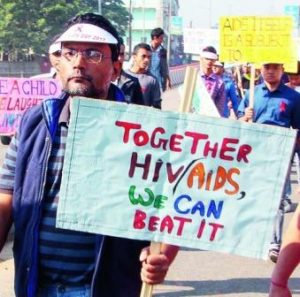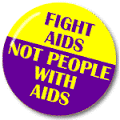From Shillong comes the news that HIV prevalence in Meghalaya has actually increased by 0.73 per cent, from 0.16 per cent in 2015, according to the HIV Sentinel Surveillance, 2017.
An official from the Meghalaya AIDS Control Society (MACS) said on Friday that that the cumulative anti-retroviral therapy (ART) data in October showed that the number of people in the state registered with HIV Care is 2,988 with 2,842 adults and 146 children.
The number of people ever started with anti-retroviral therapy is 2,261, with 2,136 adults and 125 children. The data shows that the number of people in active care are 1,834, with 1,726 adults and 108 children. The number of people alive and on anti-retroviral therapy is 1,667 with 1,567 adults and 100 children. “HIV cases in the state are on the rise,” the official said, on the sidelines of the World AIDS Day function here.
A representative of the Meghalaya State Network of Positive People said the only way to address the issue was to bring about a change in peoples’ attitude. “Most of the people living with the virus are afraid to come forward fearing they would be rejected. This celebration sends a message that they should not live in fear,” she said.
She urged all the people with HIV/AIDS to get rid of “self-stigma” and rued that most of those affected do not access the anti-retroviral therapy though it is available free of cost.
“In 2007, people living with HIV/AIDS registered with the network were around 15-20, but in October the number has increased to 1,500.”
Meanwhile from Guwahati: Assam on Friday became the first state in the country to start AIDS screening at correctional facilities. The state will soon get three more correctional centres for AIDS-affected children in Cachar, Tezpur and Dibrugarh districts.
Principal secretary, health and family welfare, Samir Kumar Sinha, announced this on the occasion of World AIDS Day on Friday.
“The centre for HIV-affected children here, Kasturi Home, is a big success for us. We have been trying to provide educational facility and medical service to those children. In Assam in the last five years the number of HIV-affected children is reduced from 12 per cent to five per cent, but we have to give new life to the recently-affected children,” Sinha said at a World AIDS Day programme organised by the Assam State AIDS Control Society here.
Talking about the current AIDS treatment scenario in Assam, Sinha said: “The boat clinic run by the National Health Mission in the riverine area of the state is another great success for us. In the last two years, the boat clinic has provided all kind of support to those people living there.”
On the initiative to introduce HIV screening facility in correctional homes, Sinha said such facility would be introduced at every centre of the state, especially at centres for women.
The Assam government and the National Health Mission have also planned to set up blood banks and blood service centres in every subdivision. Sinha said the state government is trying its best to provide financial and instrumental service to blood banks. “We look forward to setting up blood banks in every nook and corner of the state very soon. However, some financial problems are there,” Sinha said.
The Assam State AIDS Control Society (Assam SACS) and the state social welfare department had signed a memorandum of understanding last month for “HIV intervention” in correctional centres for women across the state.
In every central jail of Assam HIV screening facility will be introduced very soon. Such facilities are now available in Guwahati, Cachar and Nagaon jails.


It’s high time that people rise above from self-stigma and do not live in fear. People should break their silence and stop considering it as taboo.